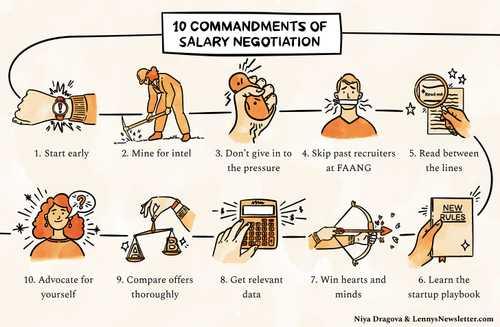Explore the World's Best Ideas
Join today and uncover 100+ curated journeys from 50+ topics. Unlock access to our mobile app with extensive features.
Negotiation starts earlier than you think
Every recruiter worth their salt will ask about your salary expectations when you first start interviewing. Do not give them a number. What to do instead: Ask for the range they’re budgeted for the role.
How to say it: “Can you tell me the salary band for this level? Happy to let you know if it’s within my range, and we can discuss specific numbers later when I’ve met the team.”
20
86 reads
Mine for intel during interviews
Go into the interview ready not just to answer questions but to ask some of your own. You will use this to negotiate later. Here are a few examples of what you should ask:
- What’s the biggest priority for the team right now?
- Why is this role open?
- What’s the biggest challenge for someone stepping into this role?
- How does the org structure on the teamwork?
20
62 reads
Don’t give in to the pressure
Once you’ve been offered the role, the recruiter’s job shifts from evaluating you to closing you. Most experienced recruiters will ask you again to put up a number for your salary. Clever recruiters may even tell you that they “will go to bat for you.”
What recruiters say: “If you give me your number, I will make it happen for you.”
What they mean: “I’ll get you something lower, but kinda close to what you asked for.”
15
62 reads
At FAANG, your recruiter may have no say at all
At FAANG-size companies (i.e. over 5K employees), compensation is heavily formulaic. In fact, there is often a separate team — the “compensation committee” — who sets your salary. They take into account your background, interview performance, and level. They give the recruiter a number to go with.
The recruiter then gives you the number, and every time you negotiate they have to go back to that committee to ask for a re-evaluation.
14
63 reads
Read between the lines
Your initial offer speaks volumes if you know how to interpret the data.
16
57 reads
At a startup, the playbook is different
You may be dealing with the founder directly. It’s very likely there is no range for the role, as smaller companies have much less access to salary data. The goal at the initial offer conversation is to understand three things:
- The current state of the company (financing, runway, profitability)
- The plan for your role/function
- The value of the equity, considering exit scenarios.
16
45 reads
Your job is to win hearts and minds
It can be tempting to think you need to negotiate now that you have data. Nope, not yet. The next step, instead, is to upsell your worth before you come back with any kind of counteroffer. This is especially important if you’re going for a senior role.
What to do next: Ask for follow-up meetings with decision-makers. If you’re a Director or higher, you can usually ask to meet with any VP and possibly C-level execs. VPs can often meet with the CEO and even board members. Take your time; this is important if you want your salary to reflect your value. If everyone wants you, you’ll be calling the shots later.
16
46 reads
OK, now get some good data
Did you know that women make only 47 cents in equity for every dollar a man makes? A HUGE reason for that is that many women don’t fully evaluate their offer before negotiating. Ask yourself these questions:
- Is the offer competitive?
- How does it work? (When do I vest; what is the stock worth?)
- Is it all true? (Is the value of the equity over-inflated?)
- Does it add up? (Consider taxes on bonuses and stock.)
- If you have goaled comp, are the goals realistic?
15
47 reads
Comparing offers
Getting paid more up-front doesn’t always mean you’ll make the most overall. Plan carefully.
Not all offers are made equal — in fact, they are intentionally confusing. At Google, you may get a front-loaded vesting schedule on your stock; at Amazon, sizable cash bonuses the first two years. It seems obvious that you should look at the comp, but that’s not everything.
14
48 reads
Time to make an ask
It can be awkward to ask for more money, but trust me, everyone expects you to do it. On top of that, it doesn’t help that so much of the advice out there is conflicting.
You absolutely do not need multiple offers. Just being able to say you’re speaking to other companies is sufficient — you can quote the expected salaries for other roles if needed.
16
45 reads
IDEAS CURATED BY
Bradley Howe's ideas are part of this journey:
Learn more about career with this collection
Cultivating a growth mindset and embracing challenges
Developing adaptive thinking and problem-solving skills
Effective learning frameworks and approaches
Related collections
Similar ideas
9 ideas
How not to bomb your offer negotiation
freecodecamp.org
5 ideas
5 ideas
How to negotiate your salary for any job
fastcompany.com
Read & Learn
20x Faster
without
deepstash
with
deepstash
with
deepstash
Personalized microlearning
—
100+ Learning Journeys
—
Access to 200,000+ ideas
—
Access to the mobile app
—
Unlimited idea saving
—
—
Unlimited history
—
—
Unlimited listening to ideas
—
—
Downloading & offline access
—
—
Supercharge your mind with one idea per day
Enter your email and spend 1 minute every day to learn something new.
I agree to receive email updates

